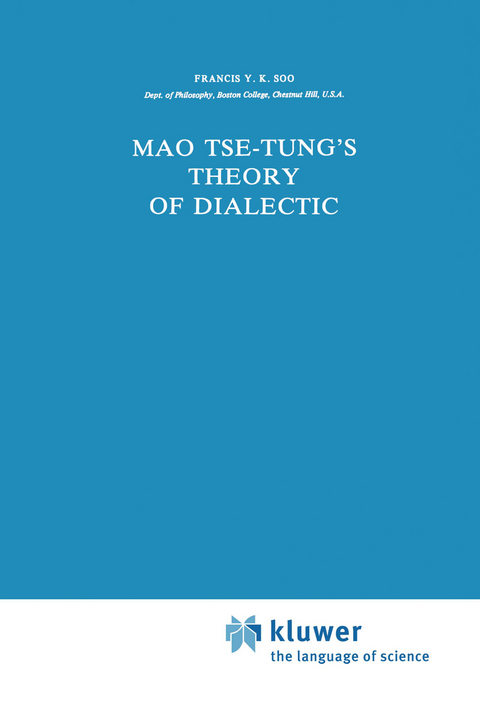
Mao Tse-Tung’s Theory of Dialectic
Springer (Verlag)
978-94-009-8391-5 (ISBN)
The Purpose of the Study.- Methodology of the Study.- A Note on Sources.- Organization of the Study.- 1 / Mao Tse-Tung: The Man and His Time.- 1.1. Historical Perspective.- 1.2. Mao Tse-tung: The Man.- 2 / Mao’s Methodology and Point of Departure.- 2.1. Textual Basis.- 2.2. Mao’s Methodology.- 2.3. Mao’s Point of Departure.- 3 / Mao’s Theory of Dialectic.- 3.1. The Concept of Contradiction.- 3.2. The Universality of Contradiction.- 3.3. The Particularity of Contradiction.- 3.4. The Dialectic of Contradiction.- 4 / On Mao’s Methodology.- 4.1. The Method of Chinese Philosophy.- 4.2. On Mao’s Synthetic Praxis.- 5 / A Philosophical Critique of Contradiction.- 5.1. ‘Dialectical Ideas’ in Chinese Thought.- 5.2. A Critique of Contradiction as a Philosophical Term.- 6 / A Philosophical Analysis of Mao’s Theory of Dialectic.- 6.1. Universality.- 6.2. Particularity.- 6.3. Dialectic.- 6.4. A Related Question.- Conclusion.- Notes.
| Reihe/Serie | Sovietica ; 44 |
|---|---|
| Zusatzinfo | XIV, 196 p. |
| Verlagsort | Dordrecht |
| Sprache | englisch |
| Maße | 152 x 223 mm |
| Themenwelt | Geisteswissenschaften ► Philosophie ► Allgemeines / Lexika |
| Geisteswissenschaften ► Philosophie ► Geschichte der Philosophie | |
| Geisteswissenschaften ► Philosophie ► Östliche Philosophie | |
| Geisteswissenschaften ► Philosophie ► Philosophie der Neuzeit | |
| ISBN-10 | 94-009-8391-3 / 9400983913 |
| ISBN-13 | 978-94-009-8391-5 / 9789400983915 |
| Zustand | Neuware |
| Haben Sie eine Frage zum Produkt? |
aus dem Bereich


